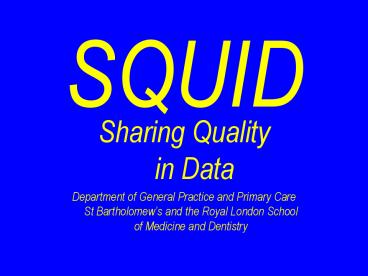SQUID - PowerPoint PPT Presentation
1 / 30
Title:
SQUID
Description:
Healthy Eastenders Project. Established 1984 - GPs and nurses in Tower Hamlets, east London. Prevention of heart disease, smoking related cancer, cervical and ... – PowerPoint PPT presentation
Number of Views:286
Avg rating:3.0/5.0
Title: SQUID
1
SQUID
- Sharing Quality in Data
- Department of General Practice and Primary
CareSt Bartholomews and the Royal London
Schoolof Medicine and Dentistry
2
Healthy Eastenders Project
- Established 1984 - GPs and nurses in Tower
Hamlets, east London - Prevention of heart disease, smoking related
cancer, cervical and breast cancer - Preventive audit
3
Preventive audit
- Process
- BP, smoking history, smoking advice, family
history IHD - alcohol, weight, height, dietary advice
- peak flow
- cholesterol
- smear, mammogram
- Where the data was recorded
4
Growth of Audit
5
Computer recording in 12 practices
6
Sharing Quality in Data
- Develop computerised disease registers
- CHD
- Raised BP
- Diabetes
- Asthma
- Computer audit
7
Data extraction
- MIQUEST
- EMIS
- Meditel
- Systems search facilities
- Import into Excel
- Analyse
8
New arrangements for Health Promotion
- Abandonment of top-down data collection
requirements for health promotion - Need for bottom-up practice driven data
collection - Consensus building amongst practices about what
data to collect in liaison with PCGs - Development of our collaborative work with the
Guidelines Project
9
Feasibility study
- One 6 doctor practice
- 80 CHD
- 84 Asthma/COAD
- 96 Diabetes
10
16 pilot practices
- 14 EMIS
- 1 Meditel
- 1 Paradoc
- 6 1-2 partners
- 10 3 partners
- 5 Tower Hamlets
- 4 Hackney
- 7 Newham
11
Identifying a dataset
- Steering group
- GPs and nurses from participating practices
- Process recording
- BP, weight etc
- Morbidity recording
- Disease registers
- Interventions
- Aspirin prophylaxis advised
12
Baseline questionnaire
- Frequency of recording
- Which codes?
- Do they have disease registers?
- Are they prepared to establish maintain them?
- What are their training needs?
- How can we facilitate this?
13
What do practices need?
- Training for individual staff
- Comparison manual computer disease registers
- Editing templates
- Seminar for Registrars
- Identifying odd bugs!!
14
Results
- Three levels
- practice (anonymised)
- each locality/borough
- three boroughs combined
15
Blood pressure recorded last 5 yrs
16
Prevalence Raised Blood Pressure recorded ever
17
Blood pressure recorded last year in patients
with raised blood pressure
18
Smoking history recorded last 5 years
19
Smoking advice given to current smokers in last 5
years
20
Prevalence COPD (excl asthma) recorded ever
21
Peak Flow recorded in last year in patients with
COPD
22
Prevalence of IHD
23
Aspirin prophylaxis recorded in patients with IHD
24
Prevalence of diabetes
25
HbA1c recorded in last year in diabetics
26
Audit feedback sessions
- Sessions one hour duration
- PGEA approved
- Joint between Squid Project and our Clinical
Guidelines facilitators now jointly merged in
Clinical Effectiveness Group - Multidisciplinary - practice nurses, GPs,
practice managers, GP registrars, and reception
staff
27
More on feedback sessions
- History of project explained
- Practice results presented and discussed often in
great detail - Session finishes with summary of discussion,
action points, and strategy for dealing with
training needs
28
More on feedback sessions
- Its useful to compare like to like its good
to know where we stand in relation to others. - We can learn from other practices what theyre
doing, which in turn can help us to get better - It really does show we need to address how we
record our clinical management. We cant allow
even 15 or 10 of our high risk groups to slip
through we have to go back and make sure we
have everyone.
29
Outcomes from feedback sessions
- IT training on data entry provided by
facilitators - Affirmation of hard work and good practice
especially by practice nurses - Facilitators enabled practices to identify
priorities - Further training needs identified, and further
visits offered - Squid data compared to recent practice audits
- Team discussion on use of their templates
- Decisions made on need for further practice
audits - Suggestions for refinements of future Squid audits
30
New clinical effectiveness cycle
- Establishing priorities and aims
- Guidelines production
- Guidelines implementation
- Information requirements
- Resource implication consideration
- User/community involvement































